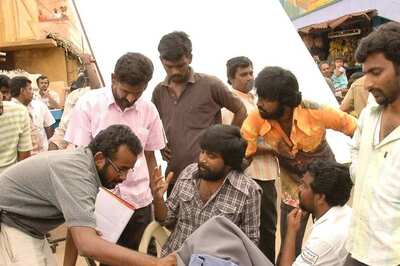
views
Manikarnika: The Queen of Jhansi
Directors: Krish Jagarlamudi, Kangana Ranaut
Cast: Kangana Ranaut, Ankita Lokhande, Danny Denzongpa, Suresh Oberoi and Jishu Sengupta
A biopic of Rani Lakshmibai, one of the earliest patriots of our freedom struggle, ought to be a special thing. Hers is the inspiring story of a brave young queen who refused to cede control of her kingdom to the British following her husband’s death; who fought alongside her troops on the battlefield; and, who in 1858 at the age of 29, lost her life in service of the land. That icon deserves a crackling film.
Manikarnika: The Queen of Jhansi is first and foremost powered by the passion of its leading lady. Kangana Ranaut is unwavering in her portrayal of Rani Lakshmibai. There’s a hard-to-miss intensity in her eyes, and tenacity in her voice. She commands the screen with a fiery, arresting presence, never letting your attention wander away from her. In the battle scenes too, galloping on a steed, charging into rows of enemy soldiers, slashing and tearing into their flesh, practically leaping onto an elephant, her valour is so convincing, even the gravity-defying stuff looks real.
Frankly, the legend of the brave queen is served well by K Vijayendra Prasad’s mythos-building screenplay, but the filmmakers don’t seem especially interested in seeking out the woman beyond the legend. Much of the information we gather during the course of the film – that Rani Lakshmibai spoke fluent English, had a love for reading, cared deeply for animals, and was fearless in battle but a compassionate mother – is released expressly for the purpose of highlighting her brilliance. Given that the filmmakers declare upfront in an opening slate that they’ve taken liberties with facts, there’s no way to know how much of it is even historically accurate.
Yet a handful of scenes spring to life. When informed that her army pales in size compared to the enemy’s, Rani Lakshmibai delivers a rousing feminist monologue, inspiring the women of her kingdom to join the men in battle. I call it a ‘full gooseflesh moment’. Equally stirring is the song Bharat composed by Shankar-Ehsaan-Loy.
The battle scenes are impressive, and the film is lacking neither in vision nor scale.
The problem is the single-track narrative and its unwillingness to explore anyone or anything other than the Rani Lakshmibai-worshipping angle. I wasn’t so bothered about the fact that the film has little room for other characters to shine, as I was by the sheer clunkiness on display. I know this is the Bollywood version of a historical, but Rani Lakshmibai breaking into a dance with the locals takes creative liberties to a whole new level. I was also dismayed by some of the hackneyed dialogue. A British officer declares in mangled Hindi after being humiliated by the queen: “Iss bezzati ka jawaab main khoon se loonga." We’re still making our characters talk like that?
There isn’t a quiet moment or a subtle note in Manikarnika: The Queen of Jhansi. This is a deliberately simplistic film; an old-fashioned patriotic saga told in the broadest of strokes, and with full nationalist fervor. Kangana Ranaut’s extraordinary performance is the film’s biggest strength, playing the woman for whom they said: “Khoob ladi mardani woh toh Jhansi wali rani thi."
That unforgettable line and the image of a female warrior on horseback, a sword raised in one hand, a baby strapped to her back, is, for many, the first thing that comes to mind when one mentions Rani Lakshmibai. As it turns out, this film, directed by Krish Jagarlamudi and Kangana herself, doesn’t expand your understanding of the iconic warrior queen much more.
I’m going with two-and-half out of five for the film, and an extra half for Kangana Ranaut’s terrific performance. Which makes it three out of five for Manikarnika: The Queen of Jhansi.
Rating: 3/5
Write your review here:


















Comments
0 comment